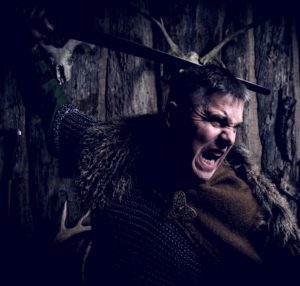Greetings and thank you,
This is my second year of eligibility for the John W. Campbell Award for Best New Writer in science fiction or fantasy. My second novel, The New Magic, is also eligible for both the Hugo and the Nebula in 2019. The New Magic launched into the Kindle Top 50 Epic Fantasy New Releases this past September, reaching #3 in Military Fantasy New Releases and allowing me the surreal experience of readers chasing me down and asking me when a book was coming out.
Dragon’s Trail, my debut novel, received a fantastic review in Publishers Weekly. It reached #1 spots in either epic fantasy or sword & sorcery on every major ebook retailer (and with some retailers, both) and broke the Kindle Top 100 Paid in four countries in 2017, going on to cross the 10,000-sales mark in the summer of 2018. Its success enabled me to join SFWA and meet several of my heroes; I’ve been a guest lecturer at high schools and college writing courses; I’ve been interviewed on drivetime radio in Seattle. We’ve been approached about the film rights.

This didn’t happen in a vacuum. It took the concerted efforts of my editor, my graphic designer, my agent, my wife, my dog—who keeps me safe while I write; very important work—and my horde of lovable maniac fans. The dog is hoping the horde eventually shows up, here, en masse.

This year, my wife and I attended WorldCon and the Hugo Awards in San Jose, California. I have trouble expressing what an honor it is to even have made the eligibility list for the Campbell as an indie author. This year’s Campbell nominees represented a who’s who of outstanding up and coming SF and fantasy writers, bending the genre and pushing boundaries to bring readers something new.
When I started writing the stories that led to the first novel in this series, Dragon’s Trail, I believed—and I still do—that when writing for adults, establishing credibility in the mundane elements of the setting is of paramount importance. Only by doing so can we create the level of suspension of disbelief necessary to introduce magical elements.
To this end, I did most of my worldbuilding research in person, much of it by learning the skills and techniques involved and trying my hand at them: swordplay, horsemanship, blacksmithing, mountaineering, traditional archery, and so on. I traveled to Europe to pace off castles and ruins, built a conlang, and eventually incorporated arcane bodies of knowledge resultant from and resident in a military career spanning both strategic intelligence and Special Operations.
Judging from the startled and often strident responses I receive from other writers when I explain my process, I will assess that not many fantasy authors have attempted this approach to worldbuilding. (In my ignorance, I honestly thought that swordfighting and rappelling off mountains was what all fantasy authors did. I write fantasy as a way to assuage both my innate skepticism and my crippling fear of a normal life.)

The mysticism and honor that binds the social and cultural fabric of the world in the series is also from firsthand experience, the product of a traditional Blackfeet upbringing in northern Montana. My stepfather, who raised me from the age of three, was full-blooded Blackfeet; my mother was a wild-eyed spinning hippie with a Master’s in Native American languages, fluent in Blackfeet, Cherokee, and Sioux. I have believed in magic and spirits from the time I was old enough to understand such things, and grew up at a crossroads of Native American mysticism and Catholicism. My military career brought me full-circle to this in the Horn of Africa some years back, when I found myself working beside soldiers from developing nations who also believe in magic. I was critically injured and nearly killed shortly thereafter, and wrote Dragon’s Trail from a wheelchair in Brooke Army Medical Center using a lot of these new experiences and touching back on my Blackfeet upbringing to interweave superstition and a sense of distant yet inexplicable magic.
Readers and reviewers comment that my “method writing” approach has created a new level of suspension of disbelief, apparently one bordering on plausible deniability. Readers have contacted me asking if I was (or still am) part of a Black Ops program guarding magic portals. My efforts, coupled with the exhaustive and brilliant work of my publishing team, have opened a new door (such as it is) for fantasy readers.
On a final note, I intended my work for an adult audience. My books feature graphic violence, adult humor, sex, and profanity. However, The New Magic has no scenes of sexual violence; I wrote it out of the worldbuilding. Further, none of the badass female characters–knights, spies, generals, sorcerers–have had to overcome an abusive past or even patriarchal roadblock. The rape trope needs to be culled from fantasy. It’s lazy writing, it’s dismissive, and it has to go.
An excerpt from Dragon’s Trail can be found here, and an excerpt from The New Magic can be found here. Copies of The New Magic are available through the SFWA forums. If you’re eligible to vote on the Nebula, the Hugo, or the Campbell–or heck, anything else you want to nominate my work for–feel free to contact me through the About the Author page on this site to request review copies.
I humbly present Dragon’s Trail and The New Magic for your consideration. Thank you.
![]()

Leave a Reply